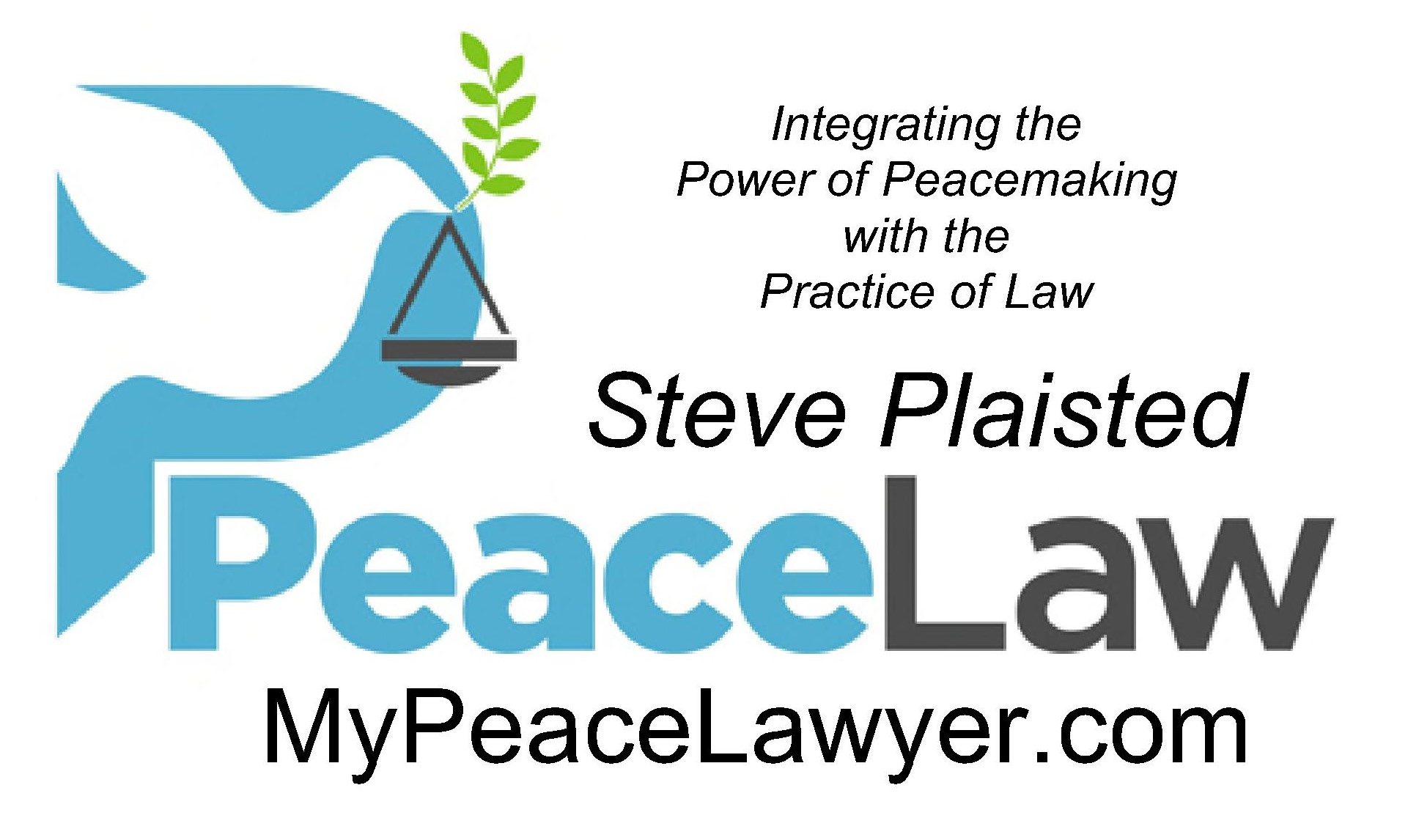“Discourage litigation. Persuade your neighbors to compromise whenever you can. Point out to them how the nominal winner is often a real loser — in fees, expenses and waste of time. As a peacemaker, the lawyer has a superior opportunity of being a good man. There will still be business enough . . . Never stir up litigation. A worse man can scarcely be found than one who does this.” ~ Abraham Lincoln
What is Peacemaking?
Peacemaking (conciliation) is more than conflict resolution. The conciliation process is based on biblical principles that promote understanding, personal responsibility, justice and relational reconciliation.
Conflicts are often resolved through secular mediation methods which help two or more angry and bitter people grudgingly agree to a compromise resolution in order to end or avoid litigation and because they lack the legal leverage to get a better result. Then they go away continuing to be angry, bitter and resentful even though they no longer have any outward conflict. BUT they obviously still have inner conflicts, which will inevitably lead to more outward conflicts if they have an ongoing relationship, such as in the case of divorced or separated parents.
The Christian conciliation process can be a wonderful, effective and life-changing process because it seeks to go much deeper than the surface issues. Steve Plaisted encourages his clients to seek to understand and resolve their conflicts through the application of biblical principles, such as “consider the interests of others and not just your own”, “love your neighbor as yourself”, “do to others as you would have them do to you” “forgive whatever grievance you have against each other”, “confess your sins to one another” and many others.*
Steve guides those in a conflict through a process of dialogue which includes thoughtful listening and which can and should lead to a humble acknowledgment of wrong acts and attitudes. When parties participate in good faith, there is much hope for the resolution of conflict and a much higher level of relational harmony for those in ongoing relationships.
Steve will consider accepting any case regardless of the religious convictions of the parties, provided they are willing to respect the Christian principles underlying the conciliation process (see “Biblical Basis” below)*. People from all different religious faiths and people with no religious faith have found Christian conciliation to be a very valuable and beneficial means of resolving conflicts with others. Many of Steve’s clients have been non-Christians who have found Steve’s services to be very beneficial and satisfying.
“The one who states his case first seems right, until the other comes and examines him.” Proverbs 18:17
Description of Services – As a “Certified Christian Conciliator” (a trademark of the Institute for Christian Conciliation), Steve Plaisted offers three levels of service. He provides conflict coaching and written resources to help individuals explore ways to resolve disputes personally and privately. Steve also provides mediation, an informal process in which one or more mediators meet with all of the people involved in the conflict to help them arrive at a voluntary settlement of their differences. Finally, Steve provides arbitration, a more formal process in which one or more arbitrators hear each side’s arguments and render a legally binding decision. (For a more detailed description of these services, see the Institute For Christian Conciliation’s publication: Guidelines for Christian Conciliation, which contains an Introduction to Christian Conciliation and Rules of Procedure.
Domestic Relations and Divorce Mediation – As a lawyer, Steve has handled domestic relations cases in Maryland since 1991, mostly in Montgomery County. That means Steve brings a knowledge of domestic relations law and local practice to the table when he conducts mediation. However, when he conducts mediation, he is not working as a lawyer for either or both parties. Instead, he works FOR both parties as a completely unbiased and neutral peacemaker. He walks clients through every issue which must be discussed and he facilitates dialogue regarding those issues. He works with a female co-mediator (his wife who is a member of the PeaceLaw team) so his clients benefit from the contributions of two neutral parties who are able to provide two independent perspectives as well as male and female perspectives. In the mediation context, four heads (two mediators and two clients) work together simultaneously to think of beneficial and sometimes creative solutions to problems.
You are much less likely to achieve mutually beneficial outcomes that you both believe are fair and just when you negotiate a separation agreement through your lawyers and you are even less likely to achieve a mutually beneficial and satisfactory result when you ask a judge to make those decisions for you. (It’s important to note that the litigation context is of an adversarial nature and litigation attorneys make their livelihood off of the conflict of their clients and they can “assist” in perpetuating the conflict through extraordinary, burdensome legal requests, all of which are costly for the client(s).)
Even though Steve provides coaching, mediation and arbitration services and helps parties negotiate separation and property settlement agreements when necessary, it is never Steve’s intention or desire to facilitate a divorce when there is any hope of reconciliation. Like God, Steve loves relational reconciliation and loves to be a part of the process of relational reconciliation.
Steve can provide a wealth of information to clients to help them make an informed decision about the issue of divorce before it is too late. He can also explain why divorce is usually NOT the answer to an unhappy marriage and Steve can provide information which may restore your hope for a brighter future without a divorce. (CLICK to see the RESOURCES section on the FamilyLaw page.)
Marriage Renovation Mediation – Even if you have “tried everything,” Steve has wonderful news for you. Most divorces can be avoided and most marriages can be renovated and eventually transformed into marriages which are more satisfying than the spouses have ever experienced and possibly better than they could have ever imagined as they follow the written plan they can create through a process which Steve calls Marriage Renovation Mediation.
Marriage Renovation Mediation is a process whereby a male and female team of mediators works with a couple to help them identify the root problems affecting their marriage and how each has contributed to the problems, to reach agreement with respect to specific steps that each spouse will take in the following months to do what is necessary to renovate and strengthen the marriage and to identify members of a support team (such as mentor couples, small groups, marriage counselors and/or therapists) who will work with the couple in the months which follow to help them make their plan work.
Everything that is identified and agreed upon is put into writing in the form of a comprehensive Marriage Renovation Agreement as opposed to the “separation and property settlement agreement” which is negotiated when spouses get divorced.
Steve purposely uses the word “renovation” instead of “reconciliation” or “restoration” because the words reconciliation and restoration imply the process of returning to some earlier state. Many marriages are built on faulty foundations and returning the couple to some previous state will not position them to build a happy and enduring marriage because they never had a strong foundation for a happy and enduring marriage. What they need is a new foundation and a blueprint for building that foundation. Steve Plaisted’s Marriage Renovation process can provide that blueprint and give a couple the tools and co-laborers that they need in order for them to build the new foundation according to that blueprint.
It is not necessary for both spouses to still be living together or, if separated, to be ready to reconcile in order for Marriage Renovation Mediation to be appropriate. This process can be a very important and crucial intermediate step before making a final decision to divorce. If the spouses are already separated and not ready to reconcile or if a period of separation is necessary before reconciliation can be a viable possibility or if reconciliation does not look like a possibility at all to one spouse, the mediated agreement can also serve as an interim separation agreement with provisions related to custody and financial matters while also containing provisions which can give the couple the opportunity to explore a possible solution that will be better for themselves and their children than divorce.
Fees – The fee for conciliation services varies depending on the conciliators involved and the services provided. Generally clients can expect to pay a lesser fee per hour for administrative services or a flat case administration fee to be determined after the initial intake interviews, and more per hour for the services of two conciliators. (Steve currently works as a team with his wife Pam who has received Conflict Coaching and Mediation training from Ambassadors of Reconciliation.)
If both parties are paying independently for conciliation services, the hourly fee is split between the parties in whatever proportions the parties agree upon. Before any meetings or consults, a retainer deposit must be received by PeaceLaw. The retainer deposit consists of an amount sufficient to pay for the initial administrative expenses and at least the first few hours of the conciliators’ time. All advance payments are held in escrow until they are earned and any unearned prepaid monies will be refunded at the completion of the case.
Biblical Basis – Steve Plaisted believes the Bible provides thorough guidance and instruction for faith and life. Therefore, Steve bases his services on scriptural principles rather than those of secular psychology or psychiatry. For a description of the principles Steve embraces, see question 21 in Part I – Introduction to Christian Conciliation – of the Guidelines for Christian Conciliation.*
Not Legal Representation – Christian conciliation may be used to resolve legal disputes. Even so, Steve does not provide people with the kind of legal advice and advocacy they would obtain if they hired a personal attorney. Instead of representing one person against another, Steve works with and FOR ALL the people in a dispute to help them find a mutually satisfactory and enduring agreement. Therefore, in order to be fully educated and counseled regarding legal matters, you should consult with an independent attorney, who is welcome to accompany and advise you during the conciliation process or before you sign any binding agreements.
Steve Plaisted’s Commitment to Confidentiality – Confidentiality is an important aspect of the conciliation process and Steve and the will carefully guard the information you entrust to him and the PeaceLaw team. To ensure that you are receiving consistent counsel and support, however, Steve may need to discuss your situation with your attorney or therapist, if you have one, and with appropriate leaders of your church, if you belong to or attend one.
Furthermore, Steve and the PeaceLaw team may need to divulge information to appropriate civil authorities if there is a clear indication that someone might otherwise be harmed (see Rules of Procedure 16 and 17 for more information on confidentiality).
Your Commitment to Confidentiality – You too must agree not to discuss our communications with people who do not have a necessary interest in the conciliation process. In addition, you must agree to treat all dealings with Steve and the PeaceLaw team in regards to this dispute as settlement negotiations, which means they will be inadmissible in a court of law or for legal discovery.
Furthermore, you must agree that you will not try to force Steve and the PeaceLaw team to divulge any information acquired during conciliation or to testify in any legal proceeding related to this dispute.
*From Introduction to Christian Conciliation of the Guidelines For Christian Conciliation.
21. What principles will I be expected to follow during Christian conciliation?
Christian conciliation promotes traditional Judeo-Christian values and principles that are an essential part of our common law and promote healthy relationships and the proper functioning of society. For example, if you submit a case to conciliation you will be encouraged to:
- Be honest: Therefore, each of you must put off falsehood and speak truthfully to his neighbor (Eph. 4:25).
- Do what is just and merciful: And what does the Lord require of you? To act justly, and to love mercy, and to walk humbly with your God (Micah 6:8).
- Accept responsibility for your actions and admit your wrongs: First take the plank out of your own eye, and then you will see clearly enough to remove the speck from your brother’s eye (Matt. 7:5).
- Keep your word: Simply let your “yes” be “yes,” and your “no” be “no” (Matt. 5:37).
- Be concerned about the interests of others: Each of you should look not only to your own interests, but also to the interests of others (Phil. 2:4).
- Listen carefully to what others say: He who answers before listening, that is his folly and his shame (Prov. 18:13).
- Overlook minor offenses: A man’s wisdom gives him patience; it is to his glory to overlook an offense (Prov. 19:11).
- Confront others constructively: Do not let any unwholesome talk come out of your mouths, but only what is helpful for building others up according to their needs, that it may benefit those who listen (Eph. 4:29).
- Be open to forgiveness and reconciliation: Be kind and compassionate to one another, forgiving each other, just as in Christ God forgave you (Eph. 4:32).
- Change harmful attitudes and behavior: He who conceals his sins does not prosper, but whoever confesses and renounces them finds mercy (Prov. 28:13).
- Make restitution for any damage you have caused: If a man uncovers a pit or digs one and fails to cover it and an ox or a donkey falls into it, the owner of the pit must pay for the loss (Ex. 21:33-34).
In other words, if you use Christian conciliation, you will be encouraged to follow the rule that God has given to govern relations between all people: “So in everything, do to others what you would have them do to you, for this sums up the Law and the Prophets.” (Matt. 7:12).
HOW TO SET UP YOUR INITIAL CONSULTATION: Contact Steve Plaisted TODAY at either PlaistedLaw@aol.com or call 301.762.7877.
AVAILABILITY: Steve Plaisted is available for appointments from about 10:00 a.m. through 6:00 p.m. Monday through Friday (afternoon appointments should not start later than 4:00) and most Saturday afternoons. To accommodate clients, Steve is also available evenings as his schedule permits.
WHERE: Steve Plaisted’s convenient Gaithersburg office (113 Billingsgate Lane, Gaithersburg, MD 20877) is in a quiet neighborhood located near Mid-County Highway and Woodfield Road which is minutes away from I-270 and the Shady Grove Metro with parking just a few steps from the office entrance.



